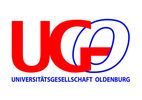Award ceremony
UGO-Open-Science-Award 2025


UGO-Open-Science-Award
The goal of the UGO-Open-Science-Award is to promote open science projects and initiatives at the Carl von Ossietzky Universität Oldenburg. The award is directed at projects and inititatives that follow open science principles in their work and actively strive to make research results transparent and accessible to the public [1].
The UGO-Open-Science-Award is awarded annually and is endowed with 1000 €. All members and affiliates of the Carl von Ossietzky Universität Oldenburg are eligible for application. Applications are open to groups as well as individuals.
For what is the price awarded?
The prize can be awarded to projects or individuals that employ or research open science practices, as well as to projects or initiatives that promote the use of open science practices. Projects or inititatives may be ongoing or completed within the last 5 years. Eligible projects or initatives include those that meet one of the following criteria:
- Making research results freely available, including publications, research data and materials, or software/analysis scripts. E.g. by sharing on appropriate online platforms/repositories or after digitization in collections.
- Use alternative publication and peer review models to enable faster and more transparent dissemination and certification of research results. E.g. registered reports, pre-registrations, open peer review, preprints.
- Improve the reproducibility of scientific research, e.g. by increasing the amount and quality of published information needed to reproduce research results. E.g. use of reproducible data processing and analysis methods.
- Develop or use (online) tools to increase the transparency of research processes and methods. E.g. develop or use reporting and metadata standards.
- Use open collaborative methods and tools to increase efficiency and broaden participation in research. E.g. involving citizens, ensuring inclusion and diversity or forms of science communication such as science blogs, popular science lectures, project websites.
- Raise awareness of open science, e.g. through events, programmes, education and training tools.
Who is the prize for?
- Individuals or groups: Applications are open to both individuals and groups. For group applications, there will be one person who applies on behalf of the group to whom the prize will be paid and who agrees to share the monetary award in agreement with the group.
- Members and affiliates of UOL: Applicants must be members or affiliates of UOL at the time of application. Since open science practices can be used and promoted by diverse status groups, the application is open to scientific, technical and administrative staff or doctoral candidates and students.
Self-application process
The application can be submitted in German or in English. Comment on the three criteria listed below in a generally understandable way. The more specific the information, the easier it will be for the jury to shortlist and make a final decision.
Description (max. 300 words): What is the project/initative about? If applicable, comment on the following aspects:
- Overview: What are the main objectives of the project or initative (in terms of Open Science and beyond, if applicable)? Who is the target group? What are the main activities that have been carried out?
- Context: What led you to implement this project or initative?
- Challenges and solutions: What challenges had to be addressed so far? Have these been resolved? If so, how?
Impact (max. 300 words): What has the project achieved so far? If applicable, comment on the following aspects
- Benefits: What benefits have been achieved (so far) by this project or initative and for whom?
- Lessons learned: What experience have you gained (so far) through your work?
Reusability (max. 300 words): What measures have been taken to enable others to re-use this project or initative? If applicable, comment on the following points:
- What steps have you taken or will you take to make the project or initative available to others?
- Is the project or initative, its structure and deliverables readily available online? If so, where (URL)?
- Can the project or initative be reused in other fields or institutions?
Evaluation
The jury, which consists of the chair of the UGO, the Vice President for Research and Transfer, a student representative and two other university members with expertise in the field of Open Science. The prize is awarded by the board of the UGO on the basis of a proposal by the jury, without recourse to legal action.
[1] The concept is based on the YERUN (young european research universities) Open Science Award and the Open Research Award Guidelines of the University of Reading.


